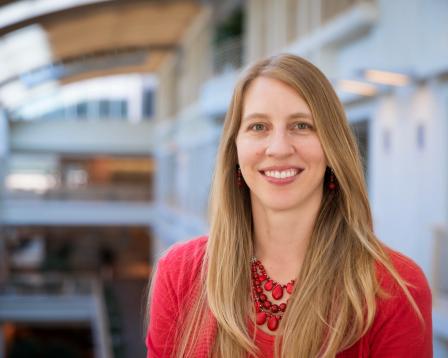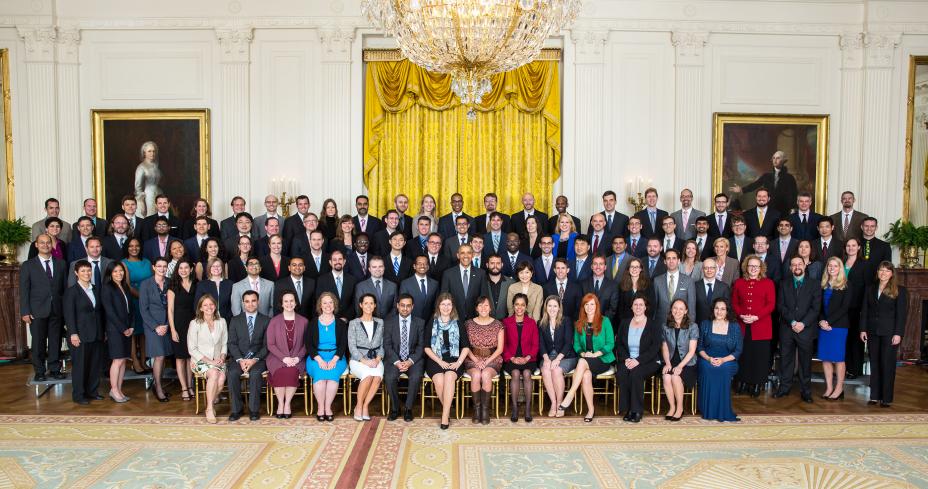Meet EPA Physical Scientist Dr. Rebecca Dodder
Dr. Rebecca Dodder received the Presidential Early Career Award for Scientists and Engineers for her innovative approach to evaluating current and emerging environmental challenges and opportunities related to energy production and use in the United States.
 EPA Physical Scientist Dr. Rebecca Dodder
EPA Physical Scientist Dr. Rebecca Dodder
Tell us about your background.
I majored in Physics and Spanish in undergrad at Vanderbilt University—this was when I really started in the sciences. After undergrad, I wanted to do something that leveraged my scientific background and my interest in public policy. I did a Masters in Science, Technology, and Public Policy at George Washington University, where I worked on a number of different issues related to everything from space policy to economic development. My advisors in the program encouraged me to do a Ph.D. and apply to MIT’s Technology Management and Policy program, so I applied—not having any idea if I would get in, but I did.
At MIT, I started off as a research assistant in the Nuclear Engineering department, but just a few weeks into the semester, funding for that project fell through and I found myself in grad school without any funding support. So, even though in undergrad many professors advised me to drop my Spanish major and pursue a math or other science major, it ended up being key when somebody told me about an air pollution research program focused on Mexico City. I started on that project working with Nobel laureate Mario Molina at MIT and later on during my dissertation work I lived in Mexico City for several years —my Spanish major came in handy after all!
This program, the Integrated Program on Urban, Regional and Global Air Pollution, is what started to get me into environmental work, specifically the energy and transportation area. After living in Mexico City I came back, finished my Ph.D., did a post-doc at MIT for a little while, and then learned about a post-doc opportunity with the EPA in Research Triangle Park. I applied and started working with the group that I’m working with now. I couldn’t have planned my path here, but I absolutely love it.
When did you first know you wanted to be a scientist?
Probably in elementary school. I just remember always being very curious about things and having a lot of really random questions. I was obsessed with Jupiter. My favorite book growing up was about the planets. Of course, it is out of date now because Pluto isn’t classified as a planet anymore, but I just remember being really interested in scientific developments.
In high school, I had a wonderful physics teacher—she was very encouraging and I think that was probably one of the first times that I realized I was really good at science. But I’ve always kind of had the seed for science.
How does your science matter?
My team’s work focuses on looking at different ways that the energy system can change over time—looking out 50 years into the future. We use energy system modeling to look at not only the electric sector but also at transportation, buildings, residential, and commercial energy use. For example, when looking at water use and the energy system, we consider a wide range of scenarios and ask questions such as: “how could constraints on water availability affect the energy system and where are there potential tradeoffs or co-benefits? Can moving towards a lower carbon future also be beneficial on the water side?” In a lot of cases, it can. We try to be forward-looking and look at a broader range of impacts from a systems-level perspective.
What do you like most about your research?
What I like most is looking at how my team can connect our work to other tools, groups, or research efforts. One of the neat things about that is the relationships you form working with people from different disciplines. It’s really enriching to do interdisciplinary work because it makes you look at your own system and problems from a different perspective. Our energy system work is usually focused on air and climate, so one of the things that I really enjoyed doing was bringing in the water use aspect as well.
If you could have dinner with any scientist, past or present, who would it be? What would you ask him/her?
I thought a lot about this; I was trying to think of something more profound but I would probably pick Neil deGrasse Tyson, even though I paid to see him speak already! I probably wouldn’t ask him anything in particular — I would just let him talk.
If you weren’t a scientist, what would you be doing?
Right now, if I wasn’t a scientist, I would be hanging out with my kids outside somewhere. And maybe be a park ranger or something. I would be out somewhere in the wilderness — I did a lot of that in undergrad and explored outside a lot as a kid. I would love to be doing more of it.
If you could have one superpower, what would it be and why?
I don’t know if this counts as a superpower but I would want to have “The Force”, because it is very versatile and apparently it passes onto your children.
Any advice for students considering a career in science?
My main advice would be for them to be open-minded and realize that it’s not always going to be a direct trajectory to exactly where they want to be, and they need to take advantage of opportunities and leverage skills that are not necessarily scientific. I was able to leverage Spanish to get onto a project that really defined where I ended up in my career, and it was a skill that I just kept fostering without really any knowledge of how it would be useful. I think keeping some of those passions and skills alive is important.
What do you think the coolest scientific discovery was and why?
It’s probably several things. First, the fact that we can now sense the impact of gravitational waves is very cool. Another thing totally outside of my field—anthropologists are discovering some of the early humanoid species and better understanding our evolution. There is also a new Open Tree of Life which is a taxonomic and evolutionary tree that maps over 2 million species—it puts perspective on where we are in relation to all of the other species on this planet. I think it’s really humbling.
What do you think is our biggest scientific challenge in the next 20/50/100 years?
From my perspective on the energy side, it’s how we start to manage some of the transitions we need to make to get to a more sustainable energy system. I think understanding how we move there from not just the technology side but also the societal side is important. It’s not so much a matter of delving in deep to something but just understanding how you move the system forward.
Whose work in your scientific field are you most impressed by?
Someone I’m really impressed by (but isn’t directly in my field) is Dan Sperling who’s very active in transportation energy. He’s the new head of the Transportation Research Board. I think what impresses me about him is how he’s always been able to bring people from all facets of public/private/non-profit sectors together and continuously engage them in a dialogue about transportation, energy, and the environment. I think his convening powers have really changed and led the field in terms of how people look at the issues and communicate about them.
 President Barack Obama joins recipients of the Presidential Early Career Award for Scientists and Engineers, including Dr. Rebecca Dodder (center, back row) for a group photo in the East Room of the White House, May 5, 2016. (Official White House Photo by Lawrence Jackson)
President Barack Obama joins recipients of the Presidential Early Career Award for Scientists and Engineers, including Dr. Rebecca Dodder (center, back row) for a group photo in the East Room of the White House, May 5, 2016. (Official White House Photo by Lawrence Jackson)